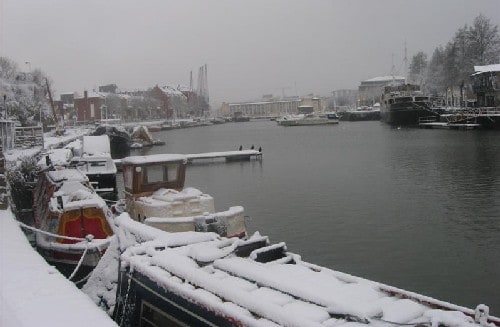
Redcliffe, Bristol
By James Dacey
Perhaps it’s the fear of appearing irresponsible, but why is it that the majority of the media always focuses on the negative aspects of snowfall? It’s always the walker stranded on a hill, the traffic standstills, the council’s failure to grit the roads; even the snow itself becomes personified with adjectives like “biting”, “terrible” or “vicious”. Fortunately, it seems that many of Bristol’s commuters were not put off by last night’s gloomy broadcasts, as there were many of us out there in the white stuff this morning snapping photos of our transformed city.
Britain is experiencing its most prolonged period of freezing conditions since 1981 – why is this? Well, the simple answer is that a zone of high pressure is sitting between Greenland and the UK, which is causing the warm, wet, westerly winds over the Atlantic to be deflected southward towards the Mediterranean. As a result, Britain is being blasted with the colder, dryer winds from Scandinavia, with up to 16 inches of snow falling last night alone over southern Britain. Many regions in northern England and Scotland have been coated in snow for the past three weeks.
But what has triggered and sustained this zone of high pressure?
Well, this is where it gets a bit more complicated but the answer, according to meteorologist Philip Eden, lies with the Atlantic jet stream – the well-defined core of strong wind that flows from northern Canada across northern Europe. These winds can exceed 400 kilometres per hour and they usually snake around to strike Britain from the south-west. At the moment, however, the jet stream has been disturbed and this is causing the winds to slow and change direction. Speaking on BBC Radio 4’s Today programme, Eden says that the jet stream now resembles a “sluggish river that meanders.”
Britain has unfortunately (or fortunately depending on situation or personality) found itself “on the cold side of a meander”, says Eden, meaning that a high pressure region from the polar region has been allowed to drift southward. You can see how this process is occurring at the website of the UK Met office.
So, I realize that by writing this post I am living up to the British stereotype of being way too fascinated by the weather, but I hope that these matters of meteorology are of some interest.



